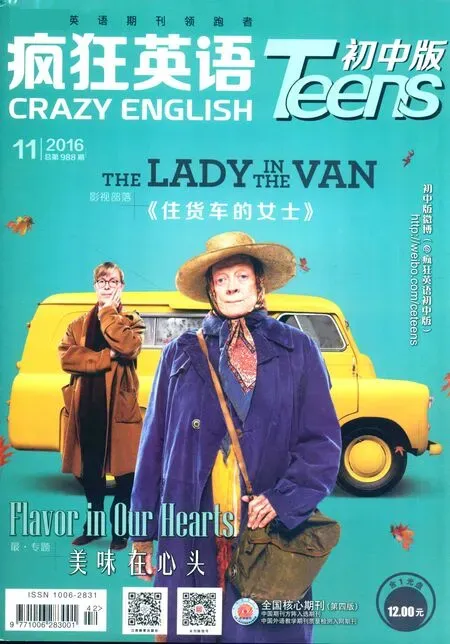口语步步高(二)
2016-11-30张新峰供稿
张新峰供稿
口语步步高(二)
张新峰供稿
一 功 ◆ 能 ◆ 口 ◆ 语
1.谈论能力
在谈论能力时,我们要学会使用情态动词can去谈论能做或不会做的事,表明自己的爱好与意愿。
常考口语⇁
Can you dance? 你会跳舞吗?
Yes, I can. /No, I can’t. 是的,我会。/不,我不会。
I can’t sing. 我不会唱歌。
I can dance. 我会跳舞。
What can you do? 你会做什么?
I can play the guitar. 我会弹吉他。
We want two good musicians for our rock band. 我们摇滚乐队需要两个好的音乐家。
Can she speak English? 她会讲英语吗?
Can you help kids with swimming? 你能帮助孩子们游泳吗?
免费套餐⇁
Who can swim? 谁会游泳?
The fish can swim. 鱼会游泳。
What can the cat do? 那猫能做什么?
It can drink its milk. 它能喝牛奶。
Can you play it well? 你弹得好吗?
Can I know your name? 我能知道你的名字吗?
快乐剧场⇁
Sam: Martha, this is my friend, Rita. She wants to join the music club.
Martha: Great! What can you do?
Rita: I can sing and I can play the piano and the guitar, but I can’t read music.
Martha: Really? You can do a lot of things. Can you come to Room Eight at three o’clock today?
Rita: Sorry, I can’t come at three. Is four o’clock ok?
Martha: Sure, that’s fine. Listen, Sam and Rita, do you want to go to a movie after the music club?
Sam and I want to see Tigers in the Park at six o’clock.
Rita: Tigers in the Park? It sounds scary.
Martha: Oh, no. It’s a comedy. Rita, you don’t like scary movies, do you?
Rita: No, I don’t.
Sam: Well, thanks for asking me. I love comedies, but I’m afraid I can’t go. My family will have dinner at six.
背景知识⇁
❶ 若想知道对方是否会做某事,应问他(她)“Can you…?”对方若会做此事便会回答“Yes, I can.(It’s easy.)”,反之便会回答“No, I can’t..(It’s too hard.)”。你若要求对方做某事,则可用祈使句直截了当地说出,亦可加上please一词表示委婉客气。例如:Please open the door.(请把门打开。)
❷ can表示“有做某事的能力”。can没有人称和数的变化,它的主语可以是人称代词主格、名词中的任何一个,can不变形。
❸ can在句中不能独立作谓语,须与实义动词或系动词be一起构成谓语,表示说话者的语气和情态。
❹ can在否定疑问句中表惊讶、赞叹等语气。例如:Can’t you see? (难道你没看见吗?)
2.谈论电影
一部好电影不仅会令人发笑,而且观看过程也会很愉快。我们都喜欢看那些有趣且有教育意义的影片。看电影不只是为了娱乐,有时也是为了身心放松。平时学习太用功,周末就应该去放松下。
常考口语⇁
Do you want to go to a movie? 你想去看电影吗?
Yes, I do. I want to see a comedy. 是的,我想去看一部喜剧片。
Does he want to go to a movie? 他想去看电影吗?
No, he doesn’t. 不,他不想去。
What kind of movies do you like? 你喜欢什么类型的电影?
I like action movies and comedies. 我喜欢动作片和喜剧片。
I like romances but I don’t like documentaries. 我喜欢爱情片,但我不喜欢纪录片。
He likes action movies but he doesn’t like romances. 他喜欢动作片,但他不喜欢爱情片。
免费套餐⇁
Do you enjoy the movie? 你喜欢这部电影吗?
How do you like the movie? 你觉得这部电影怎么样?
It’s a well-made movie. 这是一部制作精良的电影。
I can’t say much for that play. 我觉得这出戏不怎么样。
The plot’s quite simple, but it has got a great theme. 情节很简单,但主题很不错。
She’s a good actress. 她是一个好演员。
Who’s your favorite movie star? 你最喜欢的电影明星是谁?
快乐剧场⇁
A: Do you want to go to a movie?
B: Yes, I do.
A: What kind of movies do you like?
B: I like action movies and comedies. What kind of movies do you like? A: I like comedies, but I don’t like action movies.
B: Who’s your favorite movie star?
A: I like the role Vivien Leigh played in Gone with the Wind.
B: She’s a good actress.
A: Does Jim want to go to a movie?
B: Yes, he does.
A: What kind of movies does he like?
B: He likes action movies, but he doesn’t like romances.
背景知识⇁

最著名的电影奖是奥斯卡金像奖,其主要奖项包括:最佳影片、最佳导演、最佳男主角、最佳女主角、最佳男配角、最佳女配角、最佳外语片、最佳摄影、最佳特殊效果、最佳音效和最佳配乐等等。
二 口 ◆ 语 ◆ 一 ◆ 点 ◆ 通
1 Ladies first. 女士优先。
— After you, Miss. Ladies first. 您先请,小姐。女士优先。
— How kind, but let me hold the door for you. That luggage looks rather heavy.
你真好,但让我帮你扶住门吧。你的行李看起来很重。
分析▲在西方,男性见到女性,通常都会礼貌地让女性先行,不管自己手上是否提着沉重的行李,这是男性表现风度的方式。他们习惯主动替女性开门、搬行李、让女性先走。习惯享受这些礼遇的女性朋友们,回到亚洲之后可能会觉得很不适应哦!我们习惯把“女士优先”说成“lady first”,这种说法是不正确的,应该改成复数形式的“ladies first”。我们可以从第一句中看到,中文的“您先请”在英文里是说成“After you.”(我后走),思维逻辑完全相反。
2 I don’t care! 我不在乎!
— Donnie, your shirt is too dirty to wear. 唐尼,你的衬衫太脏了,不能穿了。
— I don’t care! 我不在乎!
分析▲Donnie的“I don’t care!”有时会因语调的不同而变成不礼貌的回答。我们在使用的时候要多加小心。例如:
1) “What would you like? Tea or coffee?” “I don’t care.”(“你想喝什么?茶还是咖啡?”“随便。”)
2) “May I close the window?” “I don’t care.”(“我可以把窗户关起来吗?”“请便。”)
3 See you tomorrow. 明天见。
— It’s five, everybody. Time to go home! 各位,已经五点了。该回家了!
— Phew! Am I tired! See you all tomorrow. 呼!真累!各位明天见喽。
分析▲如果你和西方人一起工作,那你很快就会发现他们特有的工作态度:在休息的时间一定会好好休息,下班以后马上回家;工作时则是专心工作,绝不谈私事或吃东西。感叹词phew可用来表示惊讶、叹息和厌恶,此处则表示疲倦。“Am I tired. ”这句话的助动词虽然在主语前面,但这并不是疑问句,只是单纯用来加强I am tired的语气。
4 What’s your favorite food? 你最喜欢吃什么?
— What’s your favorite food, Mr. Brown? 布朗先生,你最喜欢吃什么?
— Nothing in particular. I like all kinds of food. 没什么特别的。各种食物我都喜欢。
分析▲favorite是favor(偏好,喜爱)的形容词,意思是“最喜欢的,喜好的”。另外,当它用作名词时,favorite还有“最受喜爱的人/事,喜好”的意思。例如:Kathy was her father’s favorite.(凯西最得父亲的宠爱。)nothing in particular = nothing special,是想要表达“没什么特别的”时一定会用到的句子。
5 Take care. 多保重。
— Goodbye. See you tomorrow. 再见。明天见。
— Bye. Take care. 再见。保重。
分析▲如果想说“多保重”,“Take care.” 和“Take care of yourself.”都是简单好用的说法,而且满含体贴之情,在和人说再见时可以多多使用。
6 I hope you get better soon. 希望你早日康复。
— I hope you get better soon. 希望你早日康复。
— Thank you for coming all the way to see me. 谢谢你特地来看我。
分析▲探望生病或受伤的人时,可以跟对方说“I hope you get better/well soon.”。到医院去探望病人时,最好带上鲜花和卡片。对话中的coming all the way是“专程而来”的意思,可以用在许多方面,例如:
1) My father came all the way here just to see my teacher.(爸爸专程来和我的老师见面。)
2) Michael came all the way to that restaurant.(迈克尔专门到那家餐厅就餐。)
